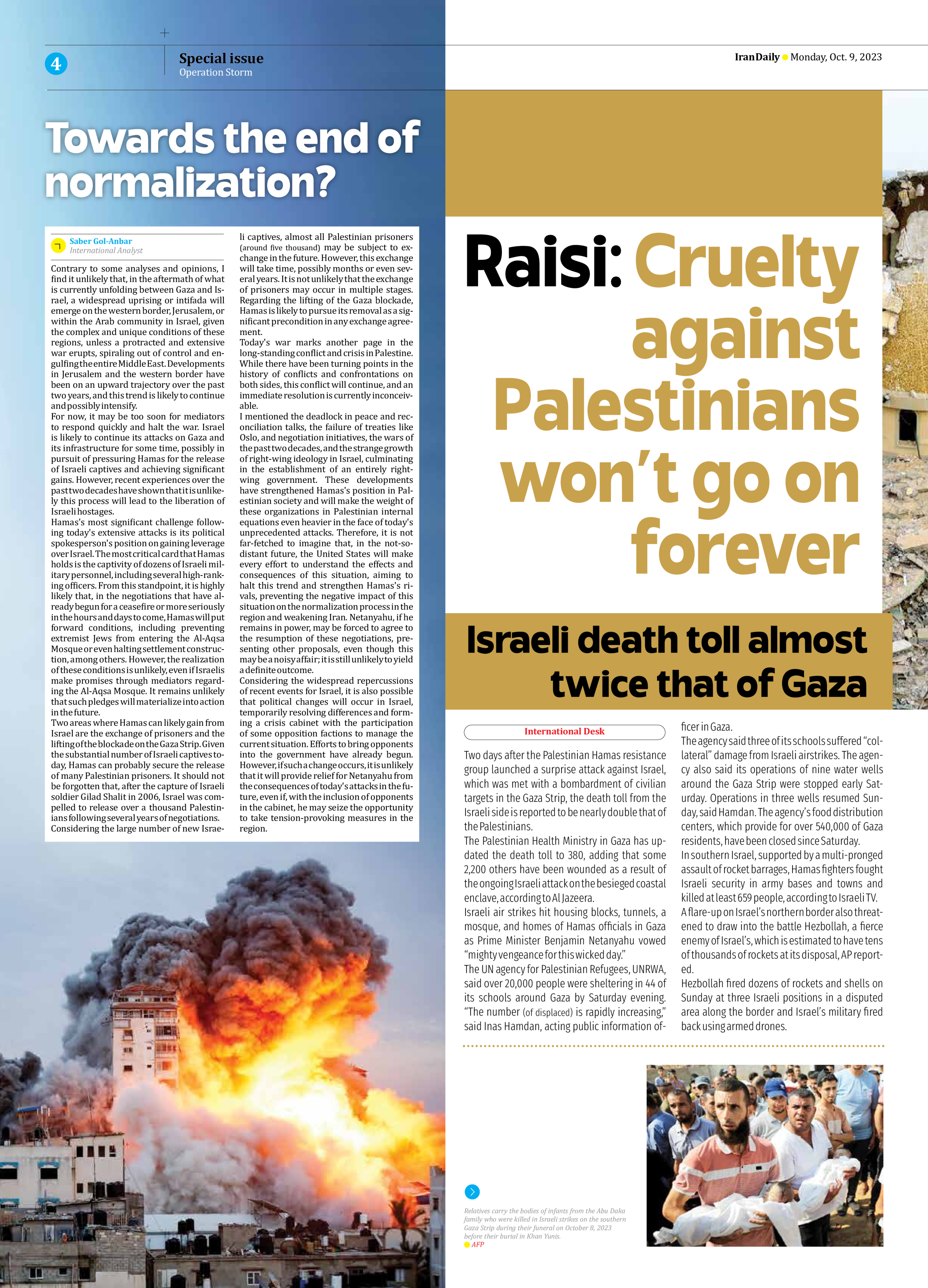
Towards the end of normalization?
Saber Gol-Anbar
International Analyst
Contrary to some analyses and opinions, I find it unlikely that, in the aftermath of what is currently unfolding between Gaza and Israel, a widespread uprising or intifada will emerge on the western border, Jerusalem, or within the Arab community in Israel, given the complex and unique conditions of these regions, unless a protracted and extensive war erupts, spiraling out of control and engulfing the entire Middle East. Developments in Jerusalem and the western border have been on an upward trajectory over the past two years, and this trend is likely to continue and possibly intensify.
For now, it may be too soon for mediators to respond quickly and halt the war. Israel is likely to continue its attacks on Gaza and its infrastructure for some time, possibly in pursuit of pressuring Hamas for the release of Israeli captives and achieving significant gains. However, recent experiences over the past two decades have shown that it is unlikely this process will lead to the liberation of Israeli hostages.
Hamas's most significant challenge following today's extensive attacks is its political spokesperson's position on gaining leverage over Israel. The most critical card that Hamas holds is the captivity of dozens of Israeli military personnel, including several high-ranking officers. From this standpoint, it is highly likely that, in the negotiations that have already begun for a ceasefire or more seriously in the hours and days to come, Hamas will put forward conditions, including preventing extremist Jews from entering the Al-Aqsa Mosque or even halting settlement construction, among others. However, the realization of these conditions is unlikely, even if Israelis make promises through mediators regarding the Al-Aqsa Mosque. It remains unlikely that such pledges will materialize into action in the future.
Two areas where Hamas can likely gain from Israel are the exchange of prisoners and the lifting of the blockade on the Gaza Strip. Given the substantial number of Israeli captives today, Hamas can probably secure the release of many Palestinian prisoners. It should not be forgotten that, after the capture of Israeli soldier Gilad Shalit in 2006, Israel was compelled to release over a thousand Palestinians following several years of negotiations.
Considering the large number of new Israeli captives, almost all Palestinian prisoners (around five thousand) may be subject to exchange in the future. However, this exchange will take time, possibly months or even several years. It is not unlikely that the exchange of prisoners may occur in multiple stages. Regarding the lifting of the Gaza blockade, Hamas is likely to pursue its removal as a significant precondition in any exchange agreement.
Today's war marks another page in the long-standing conflict and crisis in Palestine. While there have been turning points in the history of conflicts and confrontations on both sides, this conflict will continue, and an immediate resolution is currently inconceivable.
I mentioned the deadlock in peace and reconciliation talks, the failure of treaties like Oslo, and negotiation initiatives, the wars of the past two decades, and the strange growth of right-wing ideology in Israel, culminating in the establishment of an entirely right-wing government. These developments have strengthened Hamas's position in Palestinian society and will make the weight of these organizations in Palestinian internal equations even heavier in the face of today's unprecedented attacks. Therefore, it is not far-fetched to imagine that, in the not-so-distant future, the United States will make every effort to understand the effects and consequences of this situation, aiming to halt this trend and strengthen Hamas's rivals, preventing the negative impact of this situation on the normalization process in the region and weakening Iran. Netanyahu, if he remains in power, may be forced to agree to the resumption of these negotiations, presenting other proposals, even though this may be a noisy affair; it is still unlikely to yield a definite outcome.
Considering the widespread repercussions of recent events for Israel, it is also possible that political changes will occur in Israel, temporarily resolving differences and forming a crisis cabinet with the participation of some opposition factions to manage the current situation. Efforts to bring opponents into the government have already begun. However, if such a change occurs, it is unlikely that it will provide relief for Netanyahu from the consequences of today's attacks in the future, even if, with the inclusion of opponents in the cabinet, he may seize the opportunity to take tension-provoking measures in the region.







